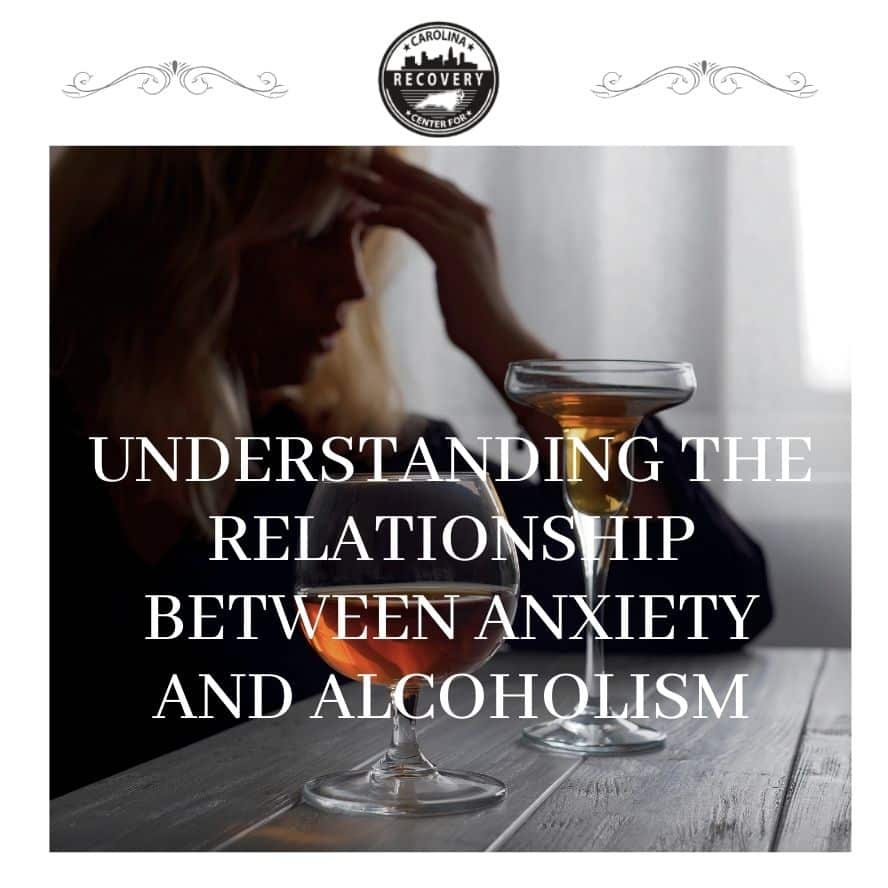Understanding the Relationship Between Anxiety and Alcoholism

Medically Verified: 2/1/24
Medical Reviewer
Chief Editor

All of the information on this page has been reviewed and verified by a certified addiction professional.
Drinking alcohol is common and widely accepted throughout the United States, and most American adults report drinking at least occasionally. Because alcohol use is so common in our culture, it can be challenging to determine when you’ve crossed the line into a problematic habit.
Many people like to unwind with a glass of wine or an after-work cocktail with friends. Having another drink to help navigate an awkward party or work event can be tempting. But what is the relationship between alcohol and anxiety– and is it ever okay to use alcohol to deal with feeling nervous or stressed out?
While having a glass of wine might provide a sense of relaxation and calm in that moment, regularly turning to alcohol to manage anxiety can lead to serious long-term consequences, including alcohol addiction.
This article will explore the relationship between anxiety and alcoholism and how to identify the need for treatment. If you or someone you love needs help to manage anxiety and alcoholism, you are not alone. Reach out to the Carolina Center for Recovery Specialists now to learn about our holistic, effective treatment programs.
The Relationship Between Anxiety and Alcoholism
Approximately 20% of people with an anxiety disorder also meet the criteria for an alcohol use disorder. When talking about the relationship between anxiety and alcoholism, it’s essential to understand both sides of this connection: untreated anxiety can lead to alcohol abuse and addiction, and alcohol addiction can cause or worsen anxiety symptoms.
Let’s look at two sides of the relationship between anxiety and alcoholism.
Anxiety and Self-Medication
Stress and anxiety are part of being human. Everyone experiences stress from time to time– and most people experience some form of stress every day. In many situations, stress is manageable. Throughout their lifetimes, people learn how to effectively manage stress and cope with challenges in healthy ways.
However, in some cases, people may face challenges that exceed their ability to cope. For example, a traumatic event like losing a loved one or a significant medical diagnosis can cause stress that exceeds a person’s ability to manage. Similarly, people with chronic anxiety may live with a constant level of stress that is unmanageable without treatment and support.
People with excessive stress or anxiety may sometimes turn to any means necessary to manage it– including alcohol. People may drink to temporarily relieve their anxiety or stress or to function in high-stress situations.
Alcohol can provide a brief respite from chronic stress and anxiety– but at a price. Regularly drinking to manage stress can lead to alcohol abuse, which can become dependence or addiction.
People who use alcohol or other substances to manage stress are more likely to develop addiction than people who drink in moderation or only drink socially. Using substances, including alcohol, to relieve physical or emotional pain is known as self-medication. Self-medication can be a significant factor in the development of alcoholism.
Alcohol’s Effect on Anxiety
Alcohol alters serotonin levels in the brain and can actually worsen anxiety. Having a drink might provide a brief sensation of calm, happiness, or contentment, but when the buzz wears off, people may be left with even more intense feelings of anxiety.
Alcohol-induced anxiety– the anxiety that lingers after drinking– can last for several hours after the effects of alcohol wear off. Some people even experience alcohol-induced anxiety for an entire day after a night of drinking.
When someone lives with anxiety and alcoholism, it’s important to get treatment for both conditions simultaneously. Treating one but leaving the other alone prevents people from genuinely healing and being able to move forward.
Recognizing Alcoholism
Alcoholism means a total loss of control over your alcohol intake. People with alcoholism do not choose to drink– they must drink for their bodies to function.
In some cases, alcoholism may be easy to identify. People may regularly drink to excess and be forced to reckon with the physical, legal, social, and financial consequences of their alcohol use.
But, in some cases, alcoholism may be harder to identify. Here are some of the signs that you or someone you love are living with alcoholism:
- You attempt to stop drinking or cut back but find that it feels impossible
- You want to stop drinking, but you can’t function without alcohol
- You develop tolerance to alcohol, meaning that you need to drink more to feel buzzed over time
- You experience intense cravings for alcohol when you are not drinking
- You experience alcohol withdrawal symptoms, such as sweating, tremors, nausea, anxiety, and insomnia if you stop drinking
- You engage in dangerous behaviors while intoxicated, such as driving under the Influence or having unprotected sex
- You continue to drink even when it causes problems in your relationships, damages your mental and physical health, or causes other significant problems
Alcoholism can quickly turn into a life-threatening situation. If you or someone you love exhibits signs of alcohol abuse or addiction, seek treatment immediately.
Find Treatment for Anxiety and Alcoholism
If you or someone you love needs treatment for anxiety and alcoholism, the effective care you need is just a phone call away. The Carolina Center for Recovery offers comprehensive dual diagnosis treatment programs that can help you manage anxiety and recover from alcoholism. A fresh start in life is waiting. Call us today to take the first step toward your new, healthier life.

